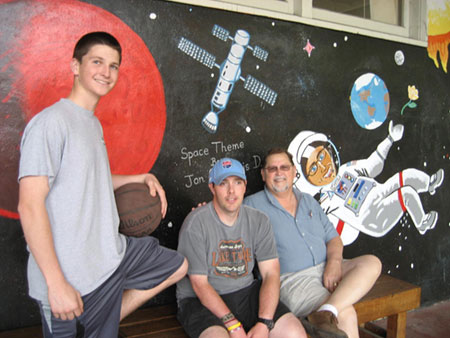
Santa Clara resident James T. Spelman has some amazing stories to tell about his experiences as founder and executive director of the non-profit Independent Peer Socialization Training Program (IPSTP) in San Jose, which serves autistic adults and children, helping them learn to socialize through interaction with peers from the community.
“My mission in life has been to make them as likeable, friendly, and compliant as possible. If they haven’t learned to get along [with others], their quality of life—their future as adults—doesn’t look hopeful,” says Spelman.
“Helping them is my life. I do it every day. Nothing surprises me anymore,” he continues, recounting a recent story in which a client got angry, took off all his clothes, and ran into the courtyard outside the classroom where the program meets. The client was very strong, making it difficult to calm him and coax him back into his clothes. But such amazing stories are not the norm.
On a typical Monday through Friday from 2:30 p.m. to 5 p.m., the after-school program runs smoothly. Clients—children and adults are in different rooms—interact socially with paid class assistants and volunteers from Bellarmine College Preparatory School who put in community service hours.
Everyone hangs out together, just being friends—playing board games, doing jigsaw puzzles, shooting hoops, or grooving with the music as Spelman, who once wanted to be a full-time musician, plays guitar, keyboard, or flute. Neighborhood walks and occasional outings such as bowling are part of the program.
High school senior Oliver Fahrner from San Jose became involved with IPSTP as a volunteer four years ago and was hired as an assistant after just one week.
“This is honestly the best first job you could have. It’s really just having a good time with some cool people,” says Fahrner. “Jim’s an awesome boss—as a role model and friend.”
Between 15 and 25 clients daily attend the adult program, which meets at the Morgan Autism Center, 2280 Kenwood Avenue, San Jose (www.morgancenter.org). Spelman’s experiences as a special education teacher there from 1976 to 1982, made him realize that peer interaction and modeling was an unmet need for the students.
“[Other than family and teachers], I realized that the students weren’t getting exposure to non-disabled people,” says Spelman. So in 1980 – 34 years ago – he established the Independent Peer Socialization Training Program (www.ipstp.org).
Importantly, IPSTP serves a rising number of adults with developmental disabilities who, once they become 22, are no longer eligible for special education school programs even though their needs continue. Spelman points out an autistic client in his 50s who is cared for by parents in their 70s.
“Many are with single parents. Autism puts a strain on the family. It ruins a lot of families,” says Spelman. “Jim’s Program,” as some call it, eases that strain for some families.
“We laugh and smile all day and love it. I don’t feel sorry for these kids. They are who they are,” says Spelman. “We find a way to help them be happy as they are.”
“The peers that visit the program get as much out of the program as the clients,” says Doug Stevens, Morgan Autism Center business administrator. “They establish relationships that last. The peers return to visit years later, and the clients remember them.”
Jill Escher, president of the Autism Society of the San Francisco Bay Area (www.sfautismsociety.org), explains that, “autism is a developmental disability that affects the neurodevelopmental functioning of the individual, resulting in significant impairments in language, social interaction and behaviors. It is considered a spectrum disorder with the nature and degree of disability varying from person to person.”





